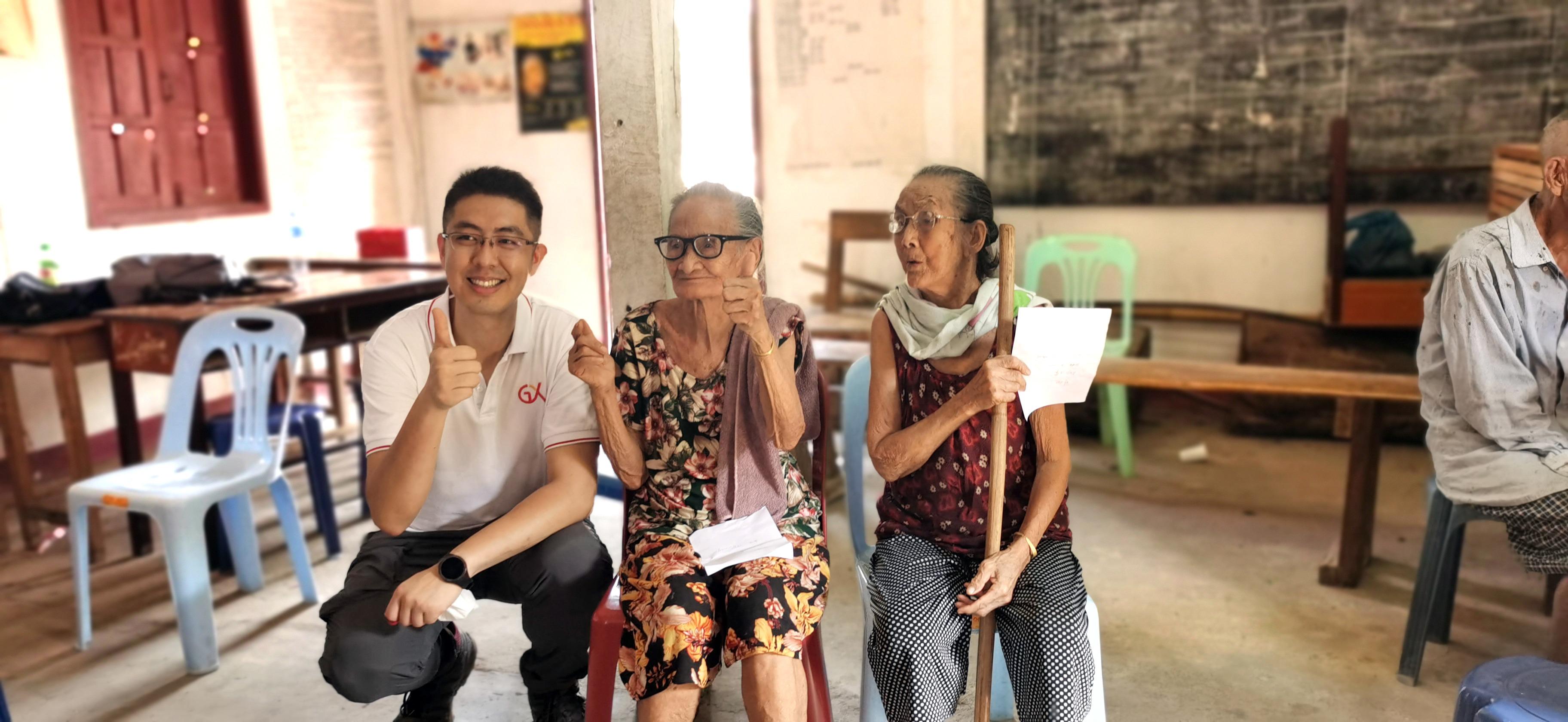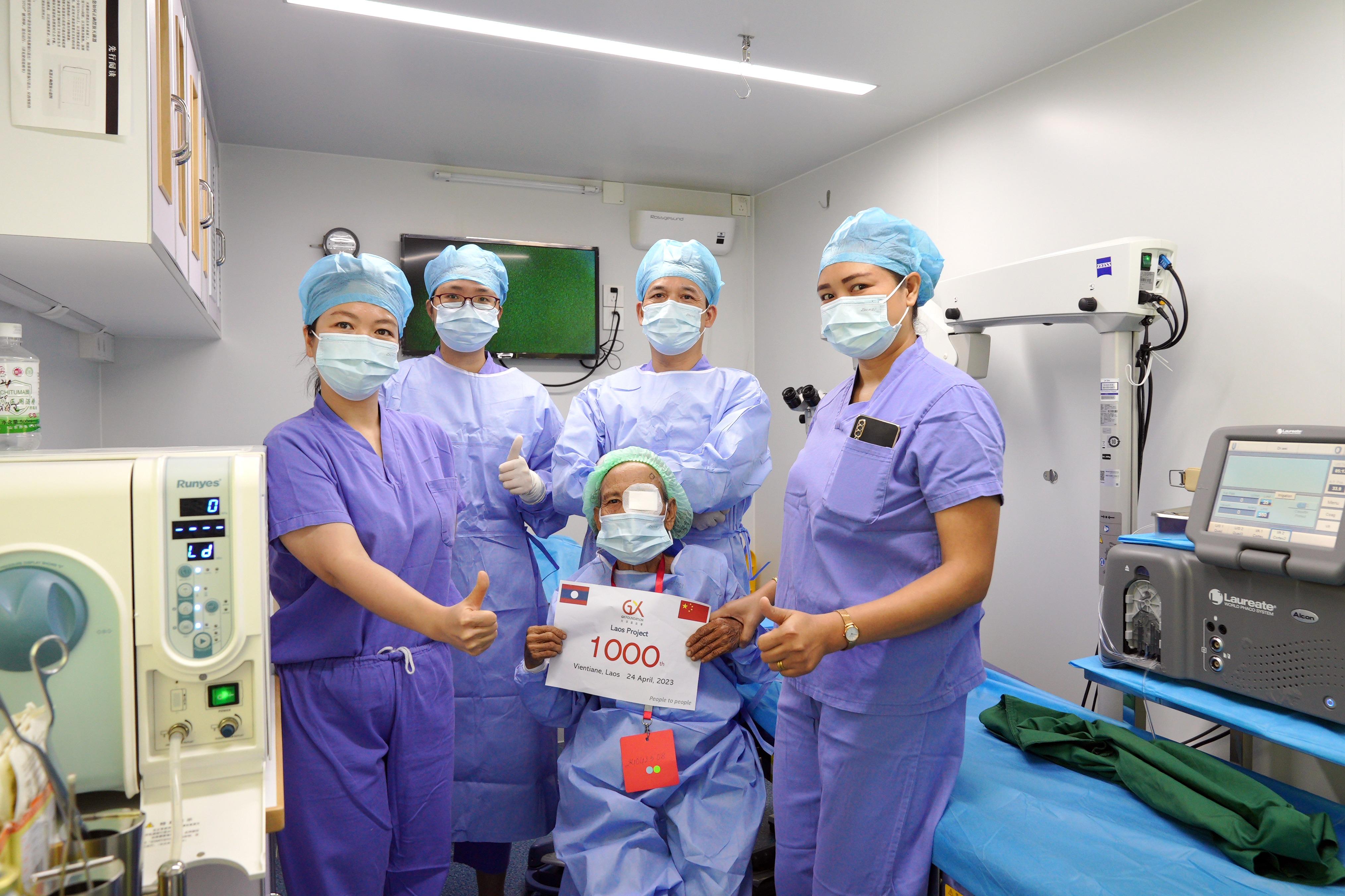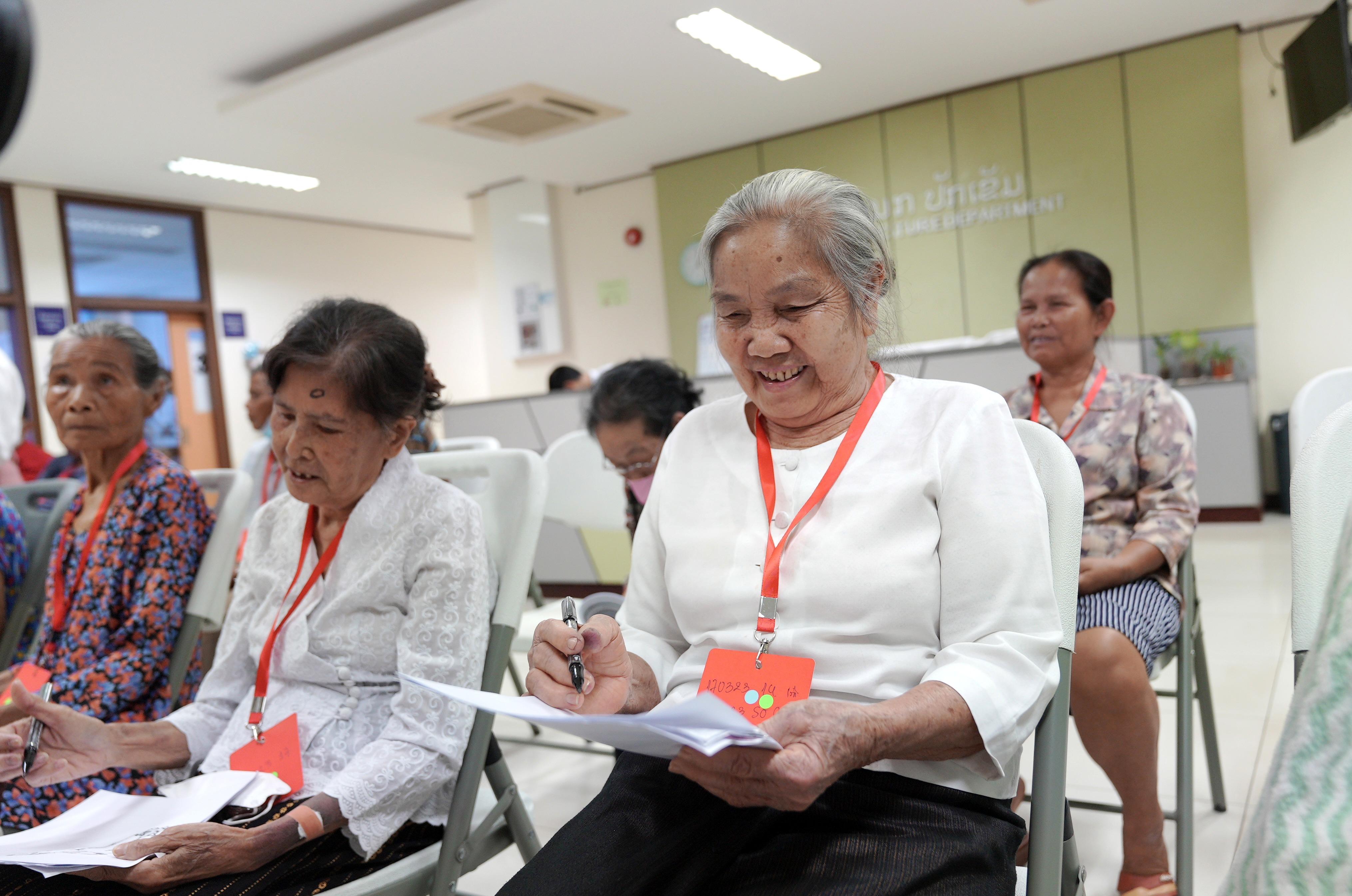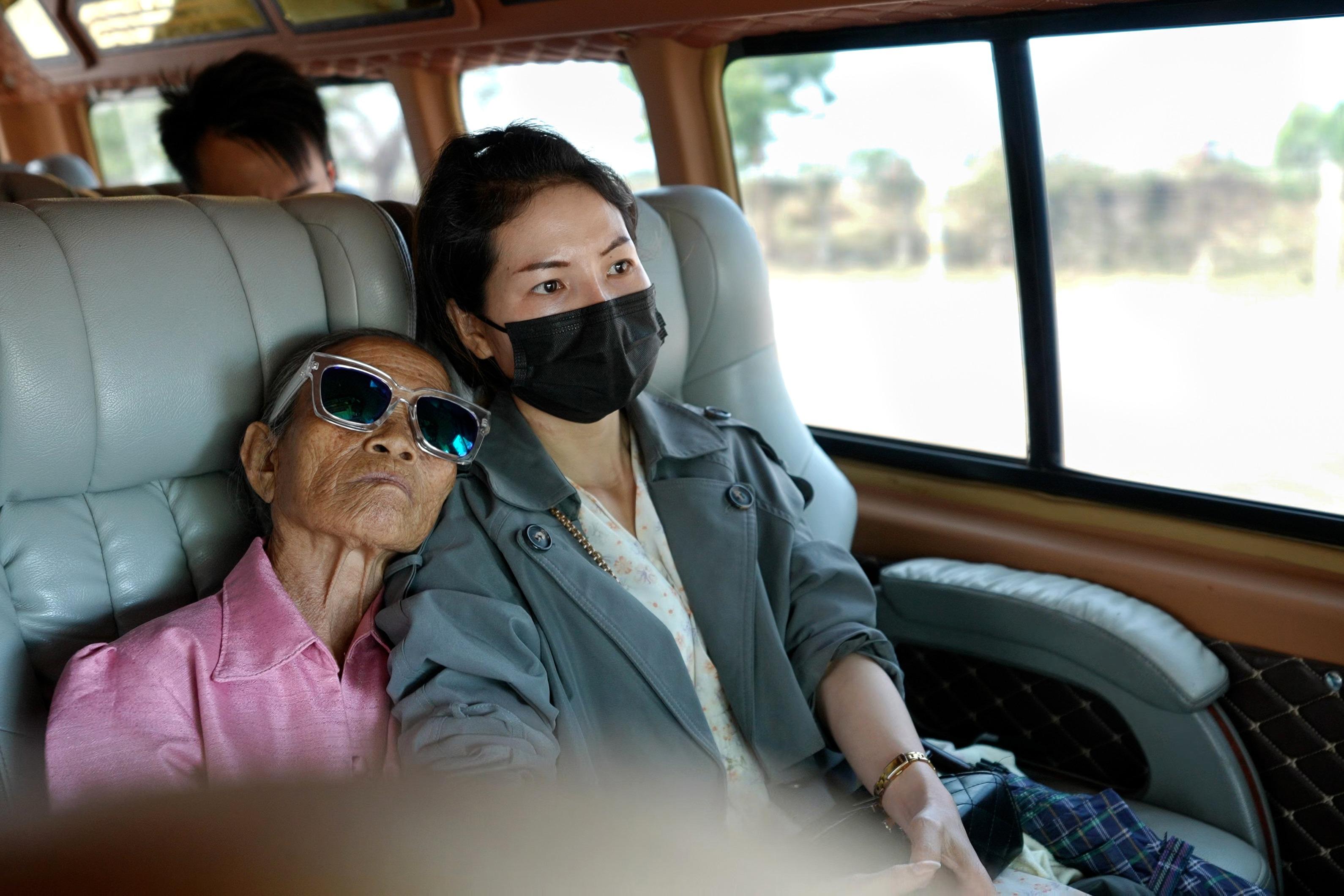A foundation in Hong Kong has been providing free surgery for people in five countries across Asia and Africa. Wang Yuke reports from Vientiane, Laos.
 Liu Sida (left), project director of the GX Foundation, poses for a photo with two patients who benefited from the charity's Cataract Blindness Elimination Project. (PHOTO PROVIDED TO CHINA DAILY)
Liu Sida (left), project director of the GX Foundation, poses for a photo with two patients who benefited from the charity's Cataract Blindness Elimination Project. (PHOTO PROVIDED TO CHINA DAILY)
Mai Tilathatkimkao gingerly edged her way down a flight of stairs from a no-frills mobile operating room parked next to the biggest hospital in Vientiane, capital of Laos.
The 76-year-old beamed from ear to ear, her left eye covered by a gauze pad while her right eye had an ecstatic twinkle.
Providing free surgery is not a sustainable answer for Laos, where cataract blindness is rife, while delivering on-site training for local doctors is (sustainable).
Wei Leqiang, Chinese surgeon with the Cataract Blindness Elimination Project, who visited Laos
Flanked by two Chinese medical professionals, she picked up the pace as much as her quivering legs could handle. She couldn't wait to embrace the people waiting for her to "come out of the blurry shell" outside the makeshift surgical center.
Caught off guard by her exuberant bear hug and radiant giggles, I found myself wrapping my arms around her shoulders. The high-octane vigor of her "rebirth" was just so infectious.
Tilathatkimkao — a frail woman, just over 1.4 meters tall, who'd had debilitating cataract blindness for many years — was the 1,000th patient to benefit from free surgery performed in Laos by the GX Foundation, which is based in Hong Kong.
The foundation's achievement marked a milestone in its Cataract Blindness Elimination Project, which aims to clear a backlog of cases in five countries participating in the Belt and Road Initiative, launched by President Xi Jinping in 2013.
The organization started the project in September, and so far it has completed more than 2,000 operations to help patients regain their sight. It aims to hit its target of 9,600 successful outcomes in Laos, Cambodia, Djibouti, Mauritania and Senegal by the end of the year.
The landmark 1,000th operation, performed on April 24, also took the program a step closer to the medical "holy grail" set by Leung Chun-ying, the foundation's chairman. "At the end of the day, the five countries will be able to declare, 'We're free of cataract backlogs'," he said.
Dreams become reality
Because Tilathatkimkao's degenerating vision had been left untreated for so long, the milestone operation was one of the thorniest, and biggest, tasks for Chinese surgeon Wei Leqiang. The elderly patient's operation took 35 minutes — 10 minutes longer than usual — and was one of the longest Wei had undertaken since he joined the project.
We were allowed to observe the surgery through a glass pane inside the mobile treatment center, where a mounted monitor showed the whole procedure — called phacoemulsification — in granular detail.
Initially, Tilathatkimkao lay peacefully on a surgical table that seemed oversized because of her diminutive size. The surgery was painless under local anesthesia, but her patience quickly wore off and she began writhing, fiddling, murmuring.
Wei swiftly lifted the scalpel, while three Chinese and Laotian medical assistants rushed over, soothing the restless patient with whispered words.
The makeshift surgical center, which was actually a converted van, was thoroughly sterilized and equipped, and rigorously calibrated to ensure that it was absolutely steady, according to Wei.
"When there's even a slight tremor on board, I have to adapt to it accordingly, to create something like 'sympathetic resonance'. I've mastered it," he said.
 Mai Tilathatkimkao (center) is the 1,000th patient in Laos to receive free cataract surgery provided by the GX Foundation, a charity in Hong Kong. (JIANG JIAXUAN / CHINA DAILY)
Mai Tilathatkimkao (center) is the 1,000th patient in Laos to receive free cataract surgery provided by the GX Foundation, a charity in Hong Kong. (JIANG JIAXUAN / CHINA DAILY)
It was a grueling wait for Tilathatkimkao's youngest daughter, Pink Phetsamone, who sat in a chair as the minutes ticked away. She had mixed feelings — unease and eagerness — at the thought of her mother regaining her sight days after she brought the senior to the hospital on a motorcycle from their home on the outskirts of Vientiane.
"Having cataract surgery has been on her mind since she first mentioned it to me three years ago," Phetsamone said.
Several ophthalmic clinics and hospitals in Vientiane provide cataract surgery, but at 7 million Lao kip ($353) it's prohibitively expensive for the family, which ekes out a living through one of Phetsamone's older sisters, the sole breadwinner, who works casual jobs on construction sites.
"I couldn't bring myself to tell her that I couldn't afford it," Phetsamone said. Three years ago, she quit her job at the Sanjiang Market — home to Chinese catering and retail businesses — to become her mother's full-time caregiver.
"I'm yearning to go back to work," she said. "Since I stopped working, I've become totally isolated, feeling like an outcast. No friends. No social life. Mom pestered me every day about the surgery. She was desperate to see."
 The joy patients experienced as a result of the improvement in their eyesight prompted them to sketch portraits of China Daily reporter Wang Yuke. (JIANG JIAXUAN / CHINA DAILY)
The joy patients experienced as a result of the improvement in their eyesight prompted them to sketch portraits of China Daily reporter Wang Yuke. (JIANG JIAXUAN / CHINA DAILY)
Struggling to express her frustration at being blind, her mother often threw tantrums. "They happened when she wanted to reach an object she thought was in front of her but then realized it wasn't. She thrashed things around her to vent her rage," Phetsamone said.
The GX Foundation's humanitarian gesture of goodwill for afflicted and impoverished people in underdeveloped countries was timely.
Phetsamone came across a Facebook post about the cataract elimination program. With faith in the skill and dedication of the Chinese medical team from the Guangxi Zhuang autonomous region, she made up her mind to travel to the capital's downtown, hoping to restore her mother's vision against all odds.
The 29-year-old became her mother's round-the-clock "walking stick". The duo inching along cross-armed or hand in hand, their tempo dictated by the ailing mother's limp, was a touching sight at the hospital, observers said.
Phetsamone had to keep her mother in sight every second to avoid any possible danger as dementia compounded the older woman's cataract blindness.
"After brain surgery in 2021, her mind started going awry. Her memory faltered. She couldn't express herself properly. Eccentric behavior was common," Phetsamone said, recalling how her mother's mental issues got her into trouble. "She has gone missing several times."
Blindness had put her mother in a more vulnerable situation and exacerbated Phetsamone's concern for her safety.
 Mai Tilathatkimkao (left) leans her head on the shoulder of her daughter, Pink Phetsamone. (JIANG JIAXUAN / CHINA DAILY)
Mai Tilathatkimkao (left) leans her head on the shoulder of her daughter, Pink Phetsamone. (JIANG JIAXUAN / CHINA DAILY)
Life-changing moment
"When a patient's gauze pads are removed the morning after the surgery, it's the moment of truth, the moment of revelation," said Leung, emphasizing that it's a life-changing moment for cataract patients.
The eyes are the window to the soul. Deprivation of, or a blur on, the window means ties are severed with the outside world. When the gauze pad is removed from the eye, patients can gain or regain more than eyesight. It is "independence in life", Leung said.
It's nothing less than transformation from a flat, monochrome world to a lively kaleidoscopic paradise, where all human connections and kinship blossom through the power of the eyes in reading souls and showing affection.
"I (once) asked a patient who was age 70-something, 'When you regain your eyesight, what's the first thing you would like to see?' He replied: 'I want to see my grandson who is 5 years old. I've been blind because of cataracts for seven years. Put yourself in that grandfather's shoes. You love your grandchild, but you've never been able to see him." Leung said.
"Light at the end of the tunnel" is synonymous with "hope". When life is shrouded in darkness and forbidding unknowns, catching a glimmer of light or even the slight knowledge that someone is out there lending a helping hand is reassuringly emotional.
The long-awaited removal of the gauze pads at 6 am the day after the surgery was like an epiphany, awash with nerves, suspense, anticipation and excitement. While the patients' reactions varied — their degree of blindness, post-surgical swelling and ages differed — the majority reported notably improved vision. Sometimes, the "unveiling" ritual was festive, redolent of a gathering of alumni.
 Cataract patients in Laos who just have their gauze pads removed express their happiness and appreciation of the surgery performed by doctors and nurses from China. (JIANG JIAXUAN / CHINA DAILY)
Cataract patients in Laos who just have their gauze pads removed express their happiness and appreciation of the surgery performed by doctors and nurses from China. (JIANG JIAXUAN / CHINA DAILY)
We observed the "jubilee" on the second day of our visit. Dozens of patients and their relatives sang and clapped in unison at the behest of Maidee Tongnengyang, a Laotian medical worker for the foundation who always exuded great energy.
Swept away by the contagious elation, I joined in with the merry scene, clapping along to the chorus, despite my ignorance of the lyrics and the song's cultural relevance. However, that seemed irrelevant as collective happiness born out of people-to-people bonds dwarfed linguistic barriers and cultural differences. While I could contribute nothing to their choir, I counted myself lucky to be adding my fair share of zeal.
A couple of senior patients who shared a sprightly streak offered to sketch my portrait. While the results turned out to be unnamable creatures from some probably unknown planets and prompted bursts of laughter, their attempts testified to their improved eyesight after surgery.
For Wei, who had left behind his responsibilities at hospitals in Guangxi's Liuzhou for two months to devote his time to the charitable cause, the journey was "absolutely worthwhile".
What he had done was a nod to the saying, "If you teach a man to fish, you feed him for a lifetime."
"Providing free surgery is not a sustainable answer for Laos, where cataract blindness is rife, while delivering on-site training for local doctors is (sustainable)," he said.
After taking Wei's advice, a Laotian doctor quickly got the hang of the procedure and has since become a sought-after practitioner.
Contact the writer at jenny@chinadailyhk.com


